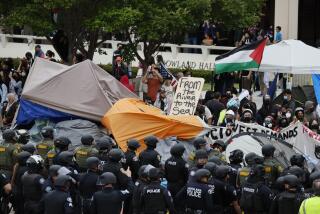Supreme Court Gives Cities More Power to Ban Pickets : OKs Limits at Private Residences
- Share via
WASHINGTON — The Supreme Court today gave communities nationwide broader power to ban picketing of private residences.
By a 6-3 vote, the court ruled that such bans do not necessarily violate free-speech rights.
The decision is a defeat for anti-abortion activists who were barred from picketing a doctor’s home in the Milwaukee suburb of Brookfield, Wis.
“There simply is no right to force speech into the home of an unwilling listener,” the court said.
Rejected Some Arguments
But the justices unanimously rejected arguments that public streets in residential neighborhoods are not the type of traditional public forum where freedom of expression is protected.
The court therefore said communities may not ban pickets from marching through a residential neighborhood, or even walking back and forth along a block on which the home they want to target is located.
Sandra Schultz, who as head of the Milwaukee Coalition for Life challenged the Brookfield ordinance, said the justices in their ruling were making a “silly distinction” between picketing in front of one house and marching through a neighborhood.
“I’m a little confused about . . . how far we have to go down the street before it’s legal,” she said. “We will just change our tactics and go a little farther down the street. It won’t deter our movement.”
Harold Furhman, the lawyer who represented Brookfield before the high court, said: “I’m very delighted with the decision. This is consistent with their past decisions and also with the position that the town took in interpreting the ordinance.”
Picketed on 6 Occasions
The Milwaukee Coalition for Life demonstrated in front of Dr. Benjamin Victoria’s home in Brookfield on at least six occasions in 1985.
Victoria performs abortions as part of his medical practice in Milwaukee and Appleton, Wis.
The demonstrators, in groups ranging in size from 11 to more than 40 people, carried signs protesting abortion and shouted slogans, such as “Dr. Victoria, you’re a killer.”
The decision also could hamper unions seeking to picket the homes of management officials during labor disputes.
The AFL-CIO had urged the justices to invalidate the Brookfield ordinance. Lorrie McHugh, a spokeswoman for the labor organization, said “unions obviously are interested in expansion, not erosion, of First Amendment rights.”
The Brookfield ordinance outlaws “picketing before or about the residence or dwelling of any individual.”
Particular Residences Protected
Justice Sandra Day O’Connor, writing for the court, said the ordinance is limited to “picketing taking place solely in front of a particular residence.”
“The ordinance permits the more general dissemination of a message,” O’Connor said. “General marching through residential neighborhoods, or even walking a route in front of an entire block of houses, is not prohibited by this ordinance.”
The court clearly sympathized with Victoria and his family.
In another case, the court gave defense contractors important protection against lawsuits by people who accuse them of making defective equipment that causes death or injury.
The justices, by a 5-4 vote, refused to reinstate a $725,000 award to the family of a Marine helicopter co-pilot who died in a 1983 crash in the Atlantic Ocean near Virginia Beach, Va.
The court said companies may not be sued when they make military equipment using a design approved by the Pentagon, as long as the contractors did not conceal any potential hazards from the government.
More to Read
Sign up for Essential California
The most important California stories and recommendations in your inbox every morning.
You may occasionally receive promotional content from the Los Angeles Times.













